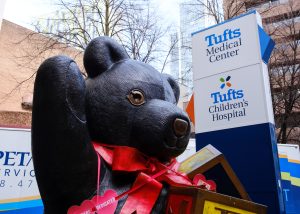UMB Muslim Student Association hosts first Iftar meal of 2007
September 24, 2007
var uslide_show_id = “82f61b30-234b-4591-95bc-9ce327cd3bbe”;var slideshowwidth = “468”;var linktext = “”;
What is Ramadan?Though many of us have heard of the Muslim celebration of the Holy month of Ramadan, few truly know the history and significance of the celebration. Ramadan is one of the Holy Months in the Islamic faith which is the ninth month of the Islamic lunar calendar. While the Islamic calendar is slightly different than the Latin calendar that we are accustomed to, the month of Ramadan occurs at a different time every year accordingly. But what is the significance of Ramadan? Why is it important to the Muslim faith? And what are students at UMB doing to celebrate this holy and the most sacred month of the Islamic faith?
Ramadan is celebrated during the ninth month of the Islamic Lunar calendar, the month in which the Prophet Muhammad (P.B.U.H.) received the verses of the Muslim Holy Book, the Quran from the messenger Angel Gabriel. The verses of the Quran are direct messages from Allah, the one and only God in Islam, to all mankind. Through Prophet Muhammad (P.B.U.H.), Allah has spread His command and His word throughout the world starting from Arabia where Muhammad (P.B.U.H.) got the revelation. Allah through Prophet Muhammad (P.B.U.H.) preached the importance of devoutness to Him and guided mankind to path He favors and warned mankind to stay from evil and ask for his forgiveness. It is believed that the first verses of Holy Quran were revealed to the Prophet (P.B.U.H.) in this month. Most of the scholars believe it to be the night between the 26th and 27th of Ramadan, though some historians may rely on another date. There is a Surah (chapter) in the Quran which talks about this night, The Night of Power, and explains the significance of this night and Muslims stay up all night till the Morning Prayer (Fajr) praying to Allah for forgiveness and guidance to the right path as this night is better than thousand months of worshiping. It was promised by Allah to the Prophet Muhammad (P.B.U.H.) that the Quran will stay as it was revealed to him till the Day of Judgment (Qiyamah). The history of Ramadan dates back to as early as 622 AD, while many scholars date it back to even before then. It has become a pious and important observation for all in the Islamic faith.
What is the significance of Ramadan? The Prophet Muhammad (P.B.U.H.) asked the Muslims in the month of Ramadan as it was ordered to him by Allah. The Muslims fast from sun up to sun down which are also the times when Muslims are prescribed to pray two of the five daily prayers. The tradition of fasting is possibly the most recognized and well-known practice in the Islamic faith which occurs during the Holy Month of Ramadan in which Muslims try to achieve inner purification and clarity. Muslims are required to abstain from food, drink or any other intake, even injections from the time of the first prayer at sun up till the time of the fourth prayer at sun down. At the time of breaking the fast at sun down, Muslims gather with family members or other Muslim fellows and celebrate another day of Ramadan and their religious devotion to Allah. The significance of fasting is well beyond simply foregoing food and drink for the month of Ramadan. The act of fasting purifies the soul and it is believed to bring a greater sympathy for those who are daily afflicted with hunger and have limited resources. This combination of both self-awareness and world-awareness gives way to another key component of Ramadan, charity. Giving to those who are less fortunate, whether by giving alms, donations, or simply by helping understand the struggle of those in poverty by fasting is important in connecting with your brothers and sisters and allowing you to appreciate what you have been given by Allah. In addition to simply fating and giving charity, it is also required that you pray five times a day. Fasting, Praying and giving charity (Zakat) are the pillars of Islam on which the structure of Islam stands. In the month of Ramadan, Muslims pray Tarawih, which are done every evening in the month of Ramadan in which the Holy Quran is completed starting from the first of Ramadan till the 27th of Ramadan, which is the Night of Power (Laila-tul-Qadr), in which it is believed that the Quran was revealed. Since the Quran has thirty parts, it is usually one part or more every evening so it can be completed by the 27th of Ramadan. This month of Ramadan helps a Muslim to ask for forgiveness from Allah and make a promise to live a life of purity and humbleness and worship Allah till death.
The MSA at UMB had an Iftar on September 20th and the PSA will be having their Iftar on September 26th. There is going to be one more iftar which is expected to be on Otober 1st. The MSA and PSA also plan to hold an Eid Dinner to celebrate the Holy of Event Eid which is celebrated after the end of Ramadan to thank Allah for the month of Ramadan.
Students plan for Ramadan”Breaking the fast with my family every night [during Ramadan] has become very special to me, since our schedules are so hectic and we don’t get to eat together anymore.” -Ambara Cadeey
“This is my first Ramadan away from home, so I’m not really doing anything special, other than school and work. And Praying and fasting of course!” -Name withheld
“For me, Ramadan is a family month. It’s also my first Ramadan in a non-Muslim country, so it’s a bit difficult when everyone around me is eating and drinking to remember I’m fasting, but I think of the importance of my religion and am able to do it.” -Ameera Ibrahim
“This year (my first in the US) hopefully I want to finish reading the Quran, do my regular prayers on time, go to the mosque for prayers, and give to charity.” -Farhat Al-Adawi
What does Ramadan mean to you?”Ramadan is a month in which as Muslim can practice more and make a resolution to carry on with practicing Islam even after Ramadan.” -Muhammad Shahab”Fasting and praying. And we don’t listen to music or watch TV during Ramadan. Nothing else [aside from worship] really matters during Ramadan.” -Minhaz Chikhalia”I’m working full time and school part time and also moving into a new house, so I’m very busy. But I’ll be attending special prayers at night.” -Asif Ali”My whole family goes to the Islamic Center of New England in Quincy for the night and we pray in a large gathering from around 8-10:30…the amount of people who show up would surprise you! I will spend my last 10 days of Ramadan in the mosque to devote all that time to prayer and in the worship of Allah.” – Ali Chaudhry”To me, Ramadan is a chance to increase my iman (faith/piety) by doing extra worshipping so that after Ramadan, I can continue to do so…it’s a chance to do self-flection on the past year and to improve myself as a Muslim.” – Reem Alzaim











































































